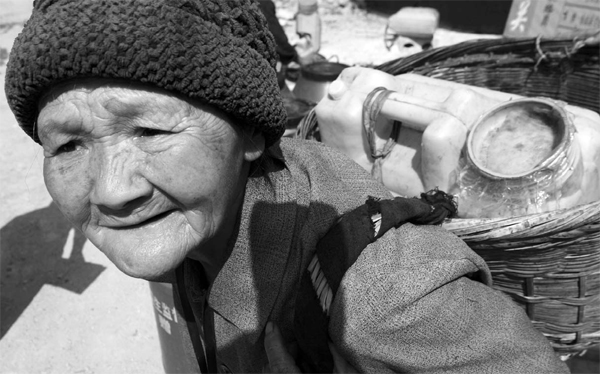Economy
No end in sight to prolonged drought in south
By Hu Yongqi (China Daily)
Updated: 2010-03-15 06:39
 |
Large Medium Small |
|
 |
|
Tan Meixin, 82, carries a 25-kg drum of water home from the Wenqian water tank. She makes the journey four times a day because her son works in the city. [HUO YAN/CHINA DAILY]
|
Villages desperate for water as dry spell drains rivers, reports Hu Yongqi from Guangxi.
Yang Xue is eight months pregnant yet every day she spends hours ferrying 25-liter drums of water from the village water tank to her thirsty family. The 21-year-old knows she is putting her health and the health of her unborn baby at risk, but she says she has little choice.
Her village of Longying in the Guangxi Zhuang autonomous region, one of the poorest areas in South China, has seen just 2.2 mm of rain since October and is suffering its worst drought for 50 years.
|
||||
Since last September, rainfall in Guangxi, as well as neighboring Yunnan and Guizhou provinces, has fallen to the lowest levels since 1952, said the China Meteorological Administration. Coupled with persistent high temperatures, the lack of rain has resulted in a severe drought that is affecting about 11 million people.
In Guangxi's remote Longlin county, officials say 11 reservoirs and 58 rivers have dried up, while villagers at the foot of mountains in the south, such as in Longying, can only rely on the rainwater that was collected in 100-cubic-meter tanks during the last monsoon season.
"The water stored in the tanks does not look healthy but we don't have any other choice," said Yang, who is Miao, the ethnic group that makes up 95 percent of her village.
The water in the tank is light yellow and dried leaves float on the surface. Although county officials insisted the supply is safe to drink after an inspection last month, villagers said they leave the water in jars overnight before drinking it to allow the fine sand to fall to the bottom.
Not only do residents need water to drink, though, their meager supplies must also irrigate their crops - mostly corn and rape - and feed their livestock. Luckily, the tank is topped up with water from an underground river six meters away.
The river was discovered in January by village head Yang Minghe, 60, and is diverted with a pump bought by the De'e township government. However, Yang Minghe said supplies still do not meet the demand.
"Villagers don't have enough water to feed their livestock so they will have to sell them. If their horses, sheep and cattle die because of a lack of water, they will get nothing," he said.
Longying is a scattering of wooden, thatched homes deep in the mountains. The people live in extreme poverty and many are forced to leave their families behind and find work in the industrial cities of neighboring Guangdong province.
Yang Yi, 16, who fetches 25 kg of water four times a day, said her family keeps cows in a ground-floor room in their home to protect them for thieves. The room used to be cleaned once a day but, as they only have enough water for drinking, they cannot wash away the smell.
"The smell is unbearable, but the cows are precious property," said the teenager. "If we don't keep them inside the house, it will be easier for thieves to take them."
"The adverse natural conditions obviously contribute to their poverty," said Zhang Yuanhong, a researcher with the rural development institute under the Chinese Academy of Social Sciences. "Some people are living in subhuman conditions and it would be hard to help them unless local governments relocate them to a more habitable place."
 “The drought proves the central authorities have, until now, paid little attention to water conservation projects. The government should build more permanent water sources, as well as improve temporary sources to boost drinking water supplies in the long term.”
“The drought proves the central authorities have, until now, paid little attention to water conservation projects. The government should build more permanent water sources, as well as improve temporary sources to boost drinking water supplies in the long term.” “We are very anxious about our farmland as the ploughing season will start in April. The government should build more water projects and improve drinking water supplies in the rural areas.”
“We are very anxious about our farmland as the ploughing season will start in April. The government should build more water projects and improve drinking water supplies in the rural areas.” “The government should strengthen the protection of water resources. It is useless building water projects if the resources are wasted. We need good policies to encourage people living near water resources to protect them.”
“The government should strengthen the protection of water resources. It is useless building water projects if the resources are wasted. We need good policies to encourage people living near water resources to protect them.”






